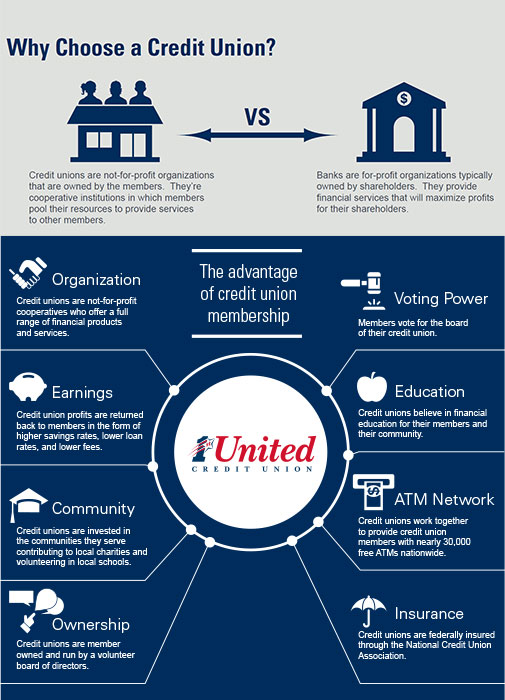Experience the most effective of Banking at a Wyoming Credit Union: Your Resident Financial Companion
Experience the most effective of Banking at a Wyoming Credit Union: Your Resident Financial Companion
Blog Article
The Ultimate Guide to Understanding Cooperative Credit Union
Cooperative credit union stand as one-of-a-kind monetary entities, rooted in principles of shared support and member-driven operations. However, beyond their fundamental worths, recognizing the intricate operations of debt unions includes a deeper exploration. Credit Unions Cheyenne. Unraveling the complexities of membership eligibility, the advancement of services provided, and the unique benefits they bring calls for a thorough exam. As we browse through the complexities of credit score unions, an informative trip waits for to drop light on these member-focused institutions and just how they differ from typical banks.
What Are Cooperative Credit Union?
Cooperative credit union are member-owned banks that use a series of banking solutions to their members. Unlike standard financial institutions, lending institution run as not-for-profit organizations, meaning their main emphasis is on offering their members as opposed to taking full advantage of earnings. Participants of a lending institution commonly share a common bond, such as helping the same employer, belonging to the same community, or becoming part of the exact same organization.
One of the key advantages of lending institution is that they frequently use higher rates of interest on interest-bearing accounts and reduced rates of interest on loans compared to financial institutions. This is since cooperative credit union are structured to profit their members straight, permitting them to hand down their revenues in the kind of better prices and less charges. Additionally, cooperative credit union are known for their individualized customer support, as they focus on constructing connections with their members to recognize their special economic demands and objectives.
History and Development of Cooperative Credit Union

The roots of member-owned monetary cooperatives, understood today as cooperative credit union, trace back to a time when areas looked for options to standard financial organizations. The idea of credit rating unions come from the 19th century in Europe, with Friedrich Wilhelm Raiffeisen commonly credited as the pioneer of the participating financial movement (Cheyenne Credit Unions). Raiffeisen started the very first recognized credit union in Germany in the mid-1800s, emphasizing neighborhood support and self-help concepts
The development of lending institution continued in North America, where Alphonse Desjardins developed the very first cooperative credit union in Canada in 1900. Quickly after, in 1909, the very first united state cooperative credit union was developed in New Hampshire by a group of Franco-American immigrants. These early credit history unions operated the fundamental principles of common aid, democratic control, and participant possession.
Gradually, lending institution have actually expanded in appeal worldwide because of their not-for-profit framework, focus on offering participants, and providing affordable monetary items and solutions. Today, credit rating unions play an essential function in the monetary industry, providing obtainable and community-oriented financial options for organizations and individuals alike.
Membership and Eligibility Standards
Subscription at a credit report union is typically limited to individuals meeting details eligibility criteria based on the organization's starting concepts and regulative needs. Some credit report unions may just offer people who function or live in a certain location, while others may be customized to staff members of a specific company or members of a specific organization.
Additionally, debt unions are structured as not-for-profit companies, meaning that their key objective is to serve their members instead of produce revenues for investors. This concentrate on member solution typically equates into even more personalized interest, lower charges, and affordable rates of interest on cost savings and lendings accounts. By satisfying the qualification standards and coming to be a member of a lending institution, people can access a variety of financial services and products customized to their particular Federal Credit Union needs.
Services and Products Offered
Among the vital elements that sets lending institution apart is the diverse series of financial product and services they use to their participants. Credit unions usually give traditional banking services such as financial savings and checking accounts, finances, and credit scores cards. Members can additionally profit from investment services, consisting of retired life accounts and financial preparation support. Numerous cooperative credit union provide affordable rate of interest on financial savings accounts and financings, along with lower costs contrasted to traditional financial institutions.
In addition, cooperative credit union often supply convenient online and mobile banking choices for participants to easily handle their finances. They may offer rewards such as common branching, allowing members to access their accounts at various other cooperative credit union across the country. Some cooperative credit union also give insurance policy items like home, auto, and life insurance coverage to assist participants protect their assets and enjoyed ones.
In addition to economic services, credit unions often take part in neighborhood outreach programs and economic education initiatives to sustain their participants in attaining their monetary goals.
Benefits of Financial With Lending Institution
When considering monetary organizations, discovering the benefits of financial with credit scores unions reveals special benefits for members seeking customized solution and competitive rates. Unlike big financial institutions, credit unions are member-owned and focus on building strong relationships with their participants. In general, banking with a debt union can provide a much more tailored, economical, and member-centric economic experience.
Conclusion

Credit rating unions are member-owned monetary organizations that use a range of banking solutions to their participants. The concept of credit scores unions come from in the 19th century in Europe, with Friedrich Wilhelm Raiffeisen commonly attributed as the pioneer of the cooperative financial activity.The evolution of credit history unions continued in North America, where Alphonse Desjardins developed the very first credit report union in Canada in 1900. Credit unions usually provide typical banking services such as savings and examining accounts, financings, and credit report cards.When considering monetary organizations, exploring the advantages of financial with credit rating unions discloses unique advantages for members looking for personalized service and affordable prices.
Report this page